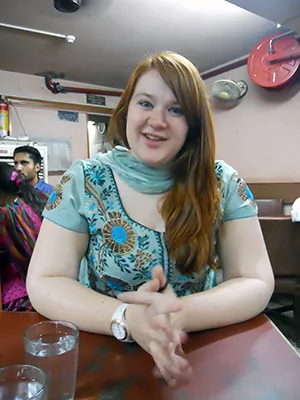
Wake up and smell the resistance
The differences between anti-authoritarian movements in the 1970s in India and Pakistan, and the role of specific coffee houses in each country in igniting pro-democracy activism, is the focus of a new study by University of Toronto Mississauga assistant professor of sociology Kristin Plys. The winner of a 2018 Connaught Fund New Researcher Award worth $35,000, Plys’ study is called “Brewing Resistance: Coffee House as a site of social protest against post-colonial authoritarianism in India and Pakistan”.
“If we care about democracy and human rights, I think it’s important to understand what strategies have and haven’t worked around the world for protesting against democracy being taken away,” says Plys, whose research focuses on the historical trajectory of international capitalism from the perspective of working class and anti-colonial movements in the Global South.
Since 2012, Plys has been studying political deliberation and cultural expression in the Indian Coffee House in Delhi, which in the early and mid-twentieth century was a prominent meeting place for left-leaning academics, writers and artists. The site was part of a chain of coffee houses established in the 1930s by the then-ruling British Empire. In the 1950s, when India’s independence movement took root, these shops were appropriated by their workers and become employee-run cooperatives; today, there are about 400 across India.
Political activism intensified at Delhi’s Indian Coffee House in 1975, when India underwent its 21-month “Emergency,” a repressive period in which Prime Minister India Gandhi ruled by decree, and allowed for the suspension of elections, curbing of civil liberties, press censorship and even forced mass sterilizations. This period also featured a clamping down on any political agitation and surveillance of students, intellectuals and journalists. Plys’ research examines how both left- and right-wing regulars of the coffee house used the space to organize actions against these human rights violations. Plys is in the process of turning her research on this subject into a book that will be published in 2020.
A different trajectory of political activism took place at the British India-created Coffee House of Lahore, which in the 1930s and 1940s was a vibrant space for progressive thinkers, cultural expression and political organizing. After the 1946 Partition between India and Pakistan, the site, which became part of Pakistan, was given to a refugee from India, who renamed it the Pak Tea House. While India was in the difficult throes of its Emergency, Pakistan was grappling with a shift toward authoritarianism that resulted in a dictatorship in 1977. As Pakistan evolved into a totalitarian state, government-led repression was harsher than in India, with opponents of the regime imprisoned, tortured or disappeared. In this environment of extreme fear and oppression, political resistance activities at the Pak Tea House significantly diminished.
Plys wants to determine how and why these two sites, which are based in neighbouring countries that both experienced government repression, played different roles in driving anti-authoritarian protest. She is examining several factors, including the specific political contexts of the two countries, the different ownership models of the Indian Coffee House and the Pak Tea House, and the clientele of both sites. She spent April to June in Lahore conducting archival research and interviewing key informants to document oral histories of that period at the tea house, and did similar work in Delhi over six weeks this summer.
“The sad fact of decolonization is that they often turn into dictatorships, and that happens in so many countries across the world. This is the dark side of national independence,” Plys says. “So there’s a lot of value in better understanding how different countries respond when their democracies are in jeopardy.”
